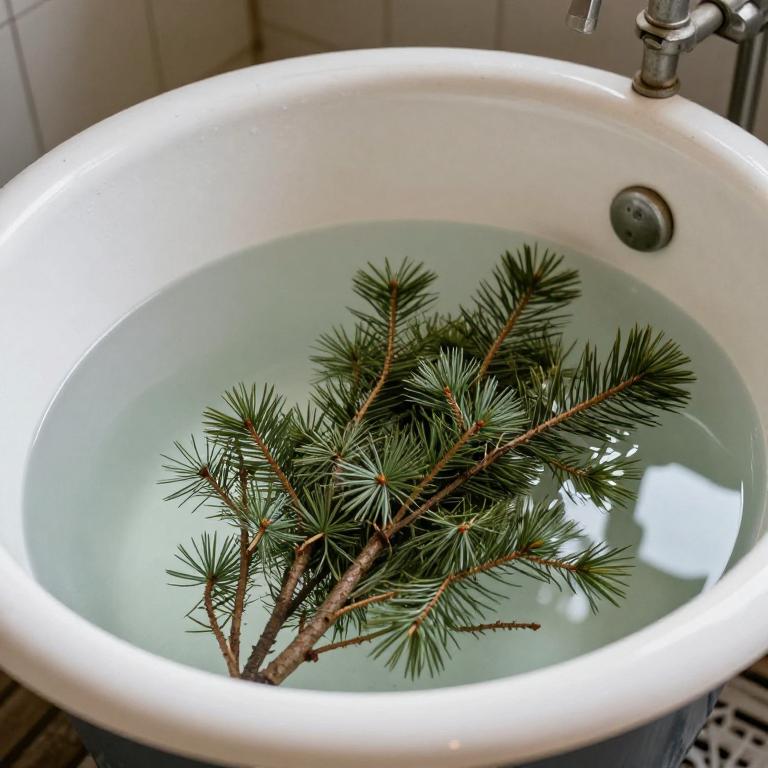10 Best Herbal Baths For Blocked Nose

Herbal baths can be an effective natural remedy for relieving a blocked nose by promoting nasal drainage and reducing inflammation.
Certain herbs such as eucalyptus, peppermint, and chamomile are known for their decongestant and soothing properties when used in bath water. Adding a few drops of essential oils or a handful of dried herbs to warm bath water allows the steam to carry their beneficial compounds into the respiratory system. This method can help ease breathing, reduce sinus pressure, and provide overall relaxation.
For best results, it is recommended to soak in the bath for 15 to 20 minutes while inhaling the aromatic steam.
Table of Contents
- 1. Eucalyptus (Eucalyptus globulus)
- 2. Peppermint (Mentha piperita)
- 3. Rosemary (Rosmarinus officinalis)
- 4. Thyme (Thymus vulgaris)
- 5. Ginger (Zingiber officinale)
- 6. Salvia (Salvia officinalis)
- 7. English lavender (Lavandula angustifolia)
- 8. Stinging nettle (Urtica dioica)
- 9. Scots pine (Pinus sylvestris)
- 10. Chamomile (Matricaria chamomilla)
1. Eucalyptus (Eucalyptus globulus)

Eucalyptus globulus, commonly known as eucalyptus or gum tree, is often used in herbal baths to help alleviate symptoms of a blocked nose.
The essential oil of eucalyptus globulus contains compounds like cineole and limonene, which have decongestant and anti-inflammatory properties. When added to warm bath water, the steam from the bath can help open up nasal passages and ease breathing. This natural remedy is particularly beneficial for those suffering from colds, allergies, or sinus congestion.
Using eucalyptus globulus in a herbal bath not only provides respiratory relief but also promotes relaxation and overall well-being.
2. Peppermint (Mentha piperita)

Mentha piperita, commonly known as peppermint, is often used in herbal baths to help alleviate symptoms of a blocked nose.
The invigorating scent of peppermint can stimulate the nasal passages and promote clearer breathing when added to warm bath water. A peppermint herbal bath can also help reduce sinus pressure and ease the discomfort associated with congestion. To prepare the bath, steep a handful of fresh or dried peppermint leaves in hot water for several minutes before adding it to the bath.
This soothing and aromatic treatment not only supports respiratory comfort but also promotes relaxation and overall well-being.
3. Rosemary (Rosmarinus officinalis)

Rosmarinus officinalis, commonly known as rosemary, is a versatile herbal remedy that can be used in herbal baths to help alleviate symptoms of a blocked nose.
When added to warm water, rosemary essential oil or dried herbs release aromatic compounds that can help open up the airways and reduce nasal congestion. The steam from the bath helps to moisten the nasal passages, making it easier to breathe and easing the discomfort of a stuffy nose. Additionally, the calming properties of rosemary may help reduce stress, which can sometimes exacerbate respiratory issues.
Regular use of rosemary herbal baths can be a soothing and natural way to support respiratory health and relieve nasal blockage.
4. Thyme (Thymus vulgaris)

Thymus vulgaris, also known as thyme, is a popular herb used in herbal baths to help alleviate symptoms of a blocked nose.
When infused into bathwater, thyme's essential oils release aromatic compounds that can help open up nasal passages and ease breathing. The warming effects of the bath combined with the therapeutic properties of thyme can promote relaxation and reduce sinus pressure. This natural remedy is particularly beneficial for those seeking a gentle, non-invasive approach to nasal congestion.
However, it is important to use thyme in moderation and consult with a healthcare professional if symptoms persist or worsen.
5. Ginger (Zingiber officinale)

Zingiber officinale, commonly known as ginger, has been traditionally used in herbal baths to alleviate symptoms of a blocked nose by promoting circulation and reducing inflammation.
When added to warm water, ginger releases essential oils that can help open up nasal passages and ease breathing. The aromatic compounds in ginger, such as gingerol and shogaol, have natural decongestant properties that may help reduce sinus pressure and congestion. A ginger herbal bath can also help soothe the respiratory system and provide a calming effect, supporting overall respiratory health.
This natural remedy is a gentle and effective alternative for those seeking relief from a blocked nose without the use of pharmaceuticals.
6. Salvia (Salvia officinalis)

Salvia officinalis, commonly known as sage, has been traditionally used in herbal baths to help alleviate symptoms of a blocked nose.
The essential oils and phytochemicals in sage possess anti-inflammatory and decongestant properties that may help reduce nasal congestion. When infused into bath water, sage can promote relaxation and ease breathing by soothing the respiratory system. Its warming effect can also help open up the nasal passages and improve airflow.
While herbal baths are not a substitute for medical treatment, they can serve as a complementary remedy to support respiratory comfort.
7. English lavender (Lavandula angustifolia)

Lavandula angustifolia, commonly known as English lavender, has been widely used in herbal baths for its calming and therapeutic properties.
When infused into bath water, lavender essential oil or dried flowers can help alleviate symptoms of a blocked nose by reducing inflammation and promoting respiratory ease. The aromatic compounds in lavender have a soothing effect on the nasal passages, helping to clear congestion and ease breathing. A warm lavender bath can also relieve stress and promote relaxation, which in turn may support the body's natural ability to recover from a cold or sinus issue.
Incorporating lavender into a bath routine can be a gentle, natural way to support nasal health and overall well-being.
8. Stinging nettle (Urtica dioica)

Urtica dioica, commonly known as stinging nettle, has been traditionally used in herbal baths to alleviate symptoms of a blocked nose by promoting nasal congestion relief through its anti-inflammatory properties.
When infused into bath water, the compounds in stinging nettle may help reduce inflammation in the nasal passages, thereby easing breathing. The warming effect of the bath can also help loosen mucus and improve circulation, further supporting respiratory comfort. To use stinging nettle for a blocked nose, it is typically steeped in hot water and added to a warm bath, allowing the steam to help open up the airways.
While generally safe, it is advisable to perform a patch test and consult with a healthcare provider, especially for those with allergies or existing health conditions.
9. Scots pine (Pinus sylvestris)

Pinus sylvestris, commonly known as the Scots pine, has been traditionally used in herbal baths to help alleviate symptoms of a blocked nose.
The essential oils extracted from the needles of this pine tree possess anti-inflammatory and decongestant properties that can soothe nasal congestion when used in a warm bath. Adding a few drops of Scots pine essential oil to bath water can help open up the airways and promote respiratory ease. The steam from the bath enhances the inhalation of these beneficial compounds, offering a natural remedy for sinus pressure and nasal blockage.
This method not only provides relief but also promotes relaxation and overall well-being during a cold or allergic reaction.
10. Chamomile (Matricaria chamomilla)

Matricaria chamomilla, commonly known as chamomile, has been traditionally used in herbal baths to alleviate symptoms of a blocked nose by promoting relaxation and reducing inflammation.
When infused into warm water, chamomile releases soothing compounds that can help ease congestion and improve breathing. The aromatic properties of chamomile may also help open up airways and reduce sinus pressure, offering natural relief for nasal blockage. A chamomile bath can be a calming and therapeutic way to support respiratory comfort during colds or allergies.
Regular use of chamomile in baths may contribute to overall respiratory wellness and provide a gentle, holistic approach to managing nasal congestion.